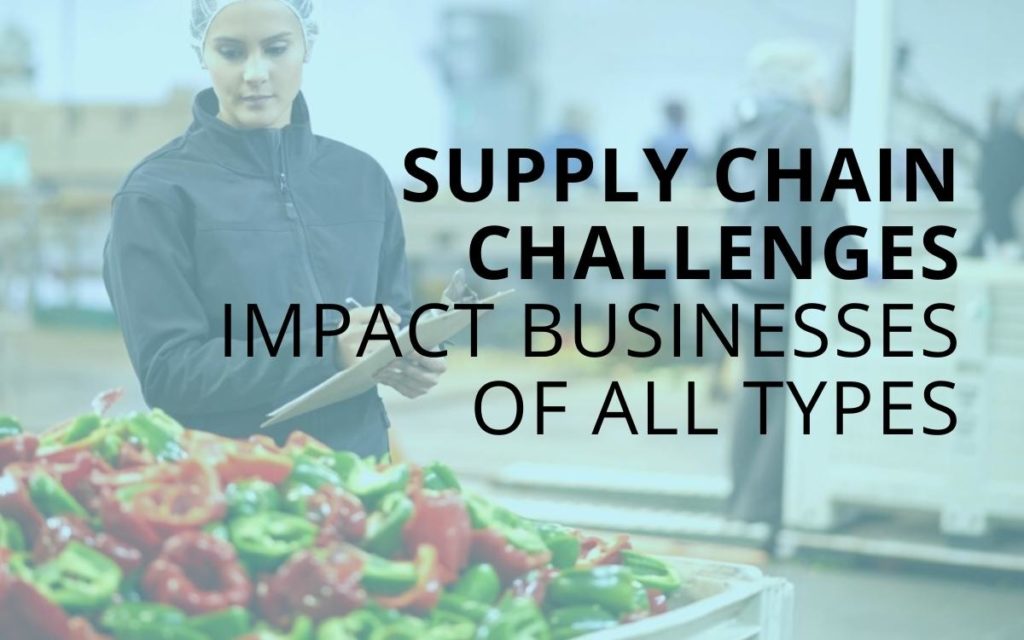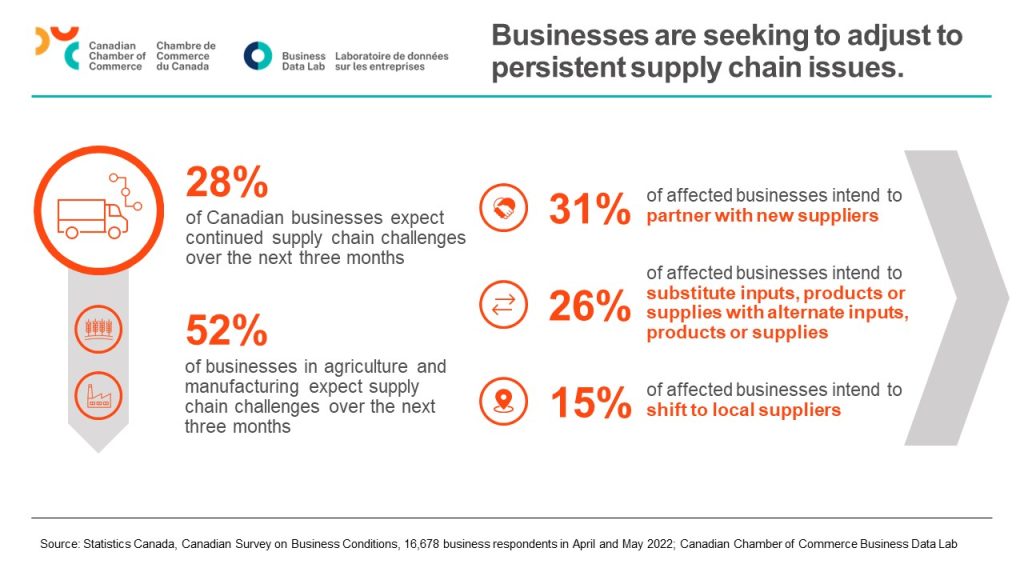Supply Chain Challenges Impact Businesses of All Types

Article supplied by the Canadian Chamber. Written by: Jarred Cohen
It is no secret that supply chains, both domestic and global, are under serious strain. We are seeing it in just about every sector of the economy, from the price of our food, to the availability of raw construction materials, and beyond. The COVID-19 pandemic has no doubt been an underlying trigger for exposing these vulnerabilities, but there are other factors at play as well, such as the ongoing war in Ukraine.
WHILE CANADA CANNOT FIX ALL THESE PROBLEMS BY ITSELF –
As a country we can zero in on some and work towards solutions through partnership and dialogue between the government and private sector.
This issue has been a top concern for the Canadian Chamber’s recently convened Food Supply Council, a cross-sectoral coalition of Canada’s leading agriculture businesses, associations, and transportation companies. These organizations, while being agriculture-focused, are foremost businesses that are attempting to address business challenges that extend well beyond an agriculture silo.
Canada is a trading nation, with trade accounting for about two-thirds of our national GDP (65%), which is higher than the OECD average (56%) and higher than many of our closest allies. And yet, Canadian Chamber members in almost every sector have reported significant obstacles to growth and expect those challenges to remain well into 2023 and perhaps beyond. Using data gleaned from the Canadian Chamber’s most recent Canadian Survey on Business Conditions Q2 report, we are seeing major challenges to Canadian businesses’ economic competitiveness. For instance, 50% of businesses expected the rising costs of inputs to be an obstacle in the next three months. Additionally, almost 40% reported transportation costs and shortage of labour as impediments to their growth.

To mitigate the impacts of these challenges, particularly the rising cost of inputs, companies are looking towards local suppliers and substituting parts wherever possible, but these are hardly sustainable solutions. Government must focus on facilitating an environment that prioritizes economic competitiveness, and it can do so in a cost-effective manner.
For example, Canada’s agriculture and agri-food sector must be recognized as a major contributor to Canada’s overall economy (1 in 9 jobs; $139 billion national GDP). Government policies on agri-food need to align with its broader economic objectives outside of Agriculture and Agri-Food Canada, which necessitates adding a economic competitiveness mandates to regulators such as Health Canada. It also requires close collaboration between regulators and businesses to share perspectives on optimal regulatory approaches. Regulatory modernization is paramount to facilitating an economically competitive environment, which will drive investments in innovation throughout the sector.
Canada also needs to ensure that any regulations do not put Canadian business at an international disadvantage by being out of step with our global trading partners. The government should work with industry and international counterparts to ensure regulatory efficiency and alignment. This will help create regulatory certainty by preventing unpredictable and burdensome regulations that hamper economic competitiveness.
On the labour side, it is crucial that Canadian businesses have the appropriate access to human skills. The CSBC survey data reveals that one-third of businesses reported the recruitment of skilled employees as an obstacle to growth. This challenge exists throughout many sectors, such as transportation, agriculture and food services. With over one million unfilled jobs, industry and government must work together to ensure that those skills are more closely connected to the needs of supply chains. This could be done through close collaboration between the federal government and all orders of government as well as businesses and chambers of commerce.
One way to fill labour gaps could be through the establishment of immigration targets, programs that leverage the skills of underrepresented populations. As competition for talent becomes an increasingly important issue for Canadian businesses, the federal government could look towards strengthening the Temporary Foreign Workers program and expanding the Atlantic Immigration program across Canada. This will help to better attract skilled newcomers and drive economic growth.
The problems facing supply chains, both within Canada and abroad, are significant. However, with close collaboration between industry and the federal government, realistic, cost-effective solutions can be achieved.
—
Writer Jarred Cohen is a Policy Advisor at the Canadian Chamber of Commerce, specializing in agriculture, cannabis, and regulatory policy.